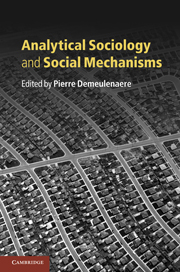Introduction
Published online by Cambridge University Press: 05 June 2012
Summary
Why should we introduce the notion of “analytical sociology” into the field of sociology, and why should it be linked to the concept of “mechanism”?
I do not believe there to be any great need to introduce new paradigms into a discipline already encumbered with so many antagonizing trends, schools and paradigms. Analytical sociology should not therefore be seen as a manifesto for one particular way of doing sociology as compared with others, but as an effort to clarify (“analytically”) theoretical and epistemological principles which underlie any satisfactory way of doing sociology (and, in fact, any social science). The social sciences already command a considerable stock of substantive descriptions and explanations; and some of the alternatives to these are either redundant, or resistant to proof, even false or imprecise, quite regardless of their status with respect to one or other established paradigm. Analytical sociology should seek to define a set of sound epistemological and methodological principles underlying all previously established and reliable sociological findings. The aim of analytical sociology is to clarify the basic epistemological, theoretical and methodological principles fundamental to the development of sound description and explanation.
The recurrent use of the term “analytical” in sociology derives mainly from the accepted notion of “analyticity,” designating a division into basic elements, the difficulty being in the determination of these clear-cut basic elements, since such division is not universally accepted – recently the notion of “holism” has been associated with a refusal to accept such a separation (see, for example, Demeulenaere 2000; Descombes 1996).
- Type
- Chapter
- Information
- Analytical Sociology and Social Mechanisms , pp. 1 - 30Publisher: Cambridge University PressPrint publication year: 2011
References
- 22
- Cited by



